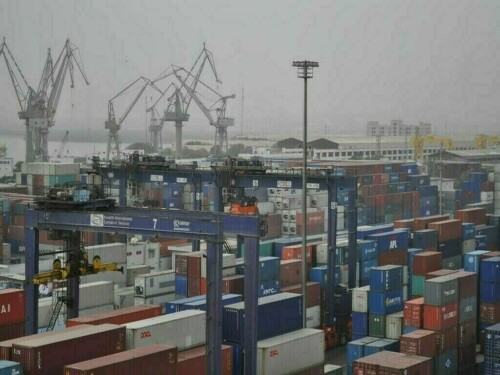Government Finalizes Recommendations to Reduce Port Congestion
The government has concluded a series of recommendations designed to decrease container dwell duration at Karachi Port and Port Qasim. The goal is to enhance cargo clearance efficiency and alleviate congestion at the nation’s two primary seaports.
A high-powered committee presented these suggestions to the Federal Minister for Maritime Affairs, Muhammad Junaid Anwar Chaudhry, on Tuesday, according to a statement issued by the Ministry of Maritime Affairs.
Anwar instructed that the recommendations be immediately sent to the Federal Board of Revenue (FBR), mandating the preparation of an implementation strategy within a two-week timeframe.
The high-level committee, formed by Anwar and led by Umer Zafar Sheikh, Additional Secretary of the Ministry of Maritime Affairs, includes representatives from Karachi Port Trust (KPT), Port Qasim Authority (PQA), Pakistan Customs, terminal operators, FBR, and other involved parties.
During the session, the federal minister highlighted that the initiative seeks to harmonize Pakistan’s port activities with international standards, facilitating quicker clearances, smoother trade operations, and reduced operational expenditures.
He also reorganized the committee, giving it a new role as an implementation body responsible for coordinating with the FBR and tracking advancement within the set timeline.
The statement noted, “The recommendations are centered on resolving obstacles throughout the clearance process, ranging from delays in submitting goods declarations, adjudication, and laboratory assessments, to concerns regarding transportation, inspection, auctioning, and gate-out procedures.”
Key Measures for Improvement
KPT Records Highest Cargo Volume in FY25
Critical actions involve encouraging early or pre-arrival submission of goods declarations, reducing the submission timeframe, and implementing penalties for late submissions. The committee has proposed online hearings to expedite adjudication, while the adoption of rapid screening technologies and expanded laboratory resources has been advised to minimize testing lags.
The statement further mentioned, “To relieve congestion at terminals, the committee has advocated for quicker auctioning and disposal of overstayed cargo, increased grounding capacity, and greater deployment of workforce and customs inspectors.”
Additionally, round-the-clock operations have been proposed for customs evaluations, inspections, laboratory tasks, and shipping services. Transportation enhancements encompass extending bonded transit, streamlining tracker installation, increasing escort personnel, and eliminating nighttime limitations on heavy vehicles.
The committee emphasized that infrastructure development plans emphasize the necessity for truck holding zones, dedicated rail cargo routes, and multi-modal transportation networks to decrease reliance on roadways.
Digitalization is another significant element of the plan, featuring proposals for artificial intelligence-driven risk assessment of importers, the establishment of a dedicated stakeholder platform within the WeBOC system, e-auction capabilities, and live communication channels connecting terminals, traders, and transporters.
The committee has also suggested shortening the free period for containers under the green and yellow channels from five days to three, enforcing strict gate-out schedules, and imposing fines for non-compliance.



Comments (0)
No comments yet. Be the first to comment!
Leave a Comment